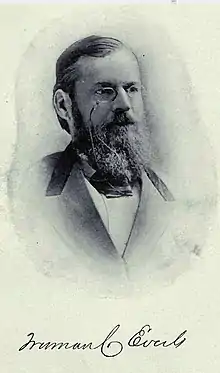Horace M. Albright | |
|---|---|
 | |
| 2nd Director of the National Park Service | |
| In office January 12, 1929 – August 9, 1933 | |
| President | Calvin Coolidge Herbert Hoover Franklin D. Roosevelt |
| Preceded by | Stephen Mather |
| Succeeded by | Arno B. Cammerer |
| Personal details | |
| Born | January 6, 1890 Bishop, California, U.S. |
| Died | March 28, 1987 (aged 97) Van Nuys, California, U.S. |
| Spouse | Grace Noble |
| Children | 2 |
| Parent | George Albright (father) |
| Occupation | Conservationist |
| Awards |
|

Horace Marden Albright (January 6, 1890 – March 28, 1987) was an American conservationist and the second director of the National Park Service.
Early life and education
Horace Albright was born in 1890 in Bishop, California, the son of George Albright, a miner. He graduated from the University of California, Berkeley in 1912, and earned a law degree from Georgetown University. Albright married his college classmate Grace Noble and they had two children.
Career and life
After graduation, he worked for the Department of the Interior in Washington, D.C. Albright became a legal assistant to Stephen Mather when Mather became Assistant Secretary in charge of National Parks, and later assisted Mather when the National Park Service (NPS) was established in 1916. As legal assistant, he helped acquire land for several new national parks in the east. When Mather became ill, Albright managed the NPS as acting director. He later served as superintendent of Yellowstone National Park and, for a short time, Yosemite National Park. On October 18, 1922, he was elected Associate Member of the Boone and Crockett Club, a wildlife conservation organization founded by Theodore Roosevelt and George Bird Grinnell, in 1887.
_(14594714147).jpg.webp)
On January 12, 1929, Albright succeeded Mather as the second director of the NPS and held the post until August 9, 1933. He next worked for the U.S. Potash Corporation and U.S. Borax and Chemical Corporation, serving variously as director, vice president, and general manager. During this time, the Albrights lived in New Rochelle, New York. In 1937, Albright's portrait was painted by artist Herbert A. Collins.[2]
Albright died in Van Nuys, California, in 1987.[3][4]
Legacy
In 1969, Albright received the National Audubon Society's highest honor, the Audubon Medal.[5]
The nation's highest civilian award, the Presidential Medal of Freedom, was awarded to Albright by President Jimmy Carter on the 64th anniversary of the National Park Service. President Carter announced the award in August 1980, and the medal was presented on December 8 by Assistant Secretary of the Interior Robert L. Herbst, in a ceremony at Van Nuys, California.[6]
Albright Grove, a grove of old-growth hemlocks and tulip poplars located in the Great Smoky Mountains National Park, was named in Albright's honor.[7] The Albright Training Center at Grand Canyon National Park, the Albright Visitor Center at Yellowstone National Park, and Albright Peak in Grand Teton National Park also bear his name.
References
- ↑ "Berkeley Citation – Past Recipients | Berkeley Awards".
- ↑ Biography of Herbert Alexander Collins, by Alfred W. Collins, February 1975, 4 pages typed, in the possession of Collins' great-great grand-daughter, D. Dahl of Tacoma, WA.
- ↑ "Horace Albright Dies. Founded Park Service". New York Times. March 29, 1987. Retrieved 2009-09-30.
Horace Marden Albright, a conservationist who was a co-founder and second director of the National Park Service, died of heart failure early yesterday at a convalescent home in Los Angeles. He was 97 years old.
- ↑ "National Park Service Co-founder Dies," Yosemite 49(1):4 (Spring 1987).
- ↑ "Previous Audubon Medal Awardees". Audubon. 2015-01-09. Retrieved 2020-07-12.
- ↑ "About Horace M. Albright". UC Berkeley Rausser College of Natural Resources. Retrieved 2020-12-02.
- ↑ "Albright Grove Trail - Maddron Bald Loop Trail in Great Smoky Mountains National Park". Mysmokymountainvacation.com. Retrieved 2013-06-19.
Further reading
- Becher, Anne, and Joseph Richey, American Environmental Leaders: From Colonial Times to the Present (2 vol, 2nd ed. 2008) vol 1 online p. 15.
External links
- Works by or about Horace M. Albright at Internet Archive
- National Park Service Biography
- "Oh, Ranger!" by Horace M. Albright and Frank J. Taylor (1928, 1929, 1934, 1972). Whimsical look at managing the National parks
- Creating the National Park Service: The Missing Years by Horace M. Albright and Marian Albright Schenck (Univ. of OK Press, 1999) Memoirs about creating the NPS written with the assistance of Albright's daughter
- Albright, Horace M. as told to Robert Cahn; The Birth of the National Park Service; The Founding Years, 1913–33; Howe Brothers, Salt Lake City, Utah; 1985.
- Horace M. Albright, Mining Lawyer and Executive. 1986 interview, Oral History Office, University of California, Berkeley. Accessed 8/16/2017
